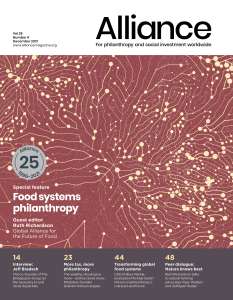A new report about evidence, influence, and food systems from the Global Alliance for the Future of Food has found that there are viable food solutions to the current climate, biodiversity, and hunger crises going untapped.
‘The Politics of Knowledge: Understanding the Evidence for Agroecology, Regenerative Approaches, and Indigenous Foodways’ is a global study that challenges how research is funded and by whom. Authors consider the influence this has on policy decisions, financial flows, and the evidence available to inform food systems transformation.
The industrialized food system is one of the biggest stressors on planetary health, contributing almost a quarter of global GHG emissions and driving 80 per cent of biodiversity loss. Agroecology, regenerative farming practices, and Indigenous knowledge are pathways to sustainable food systems and they offer a way to repair the relationship between people and nature. Evidence in support of these pathways exists in abundance but, authors argue, is not prioritized in policy, finance, or practice because a narrow view of what counts as valid evidence holds back real action — and sows seeds of doubt.
The research is anchored in debunking the most common narratives about the future of food, addressing questions about yield, scaling potential, and economic viability. Diverse forms of evidence – such as lived experience, traditional knowledge, scientific analyses, storytelling, and peer-reviewed literature – are harnessed throughout to challenge assumptions.
A core recommendation is that philanthropic, public and private funders and donors catalyze a transformative research and action agenda that: is transdisciplinary; is focused on political and social justice and food sovereignty; and, challenges vested interests. Authors note that changing today’s research, education, and innovation systems will unlock structural barriers — such as short term thinking, ‘cheap’ food, and narrow measures of success.
‘Structural and systemic blockages that stymie society’s progress toward food systems transformation are no longer acceptable,’ said Ruth Richardson, Executive Director of the Global Alliance. ‘It is long past time to confront the politics of knowledge and dive deep into the diverse evidence that shows us what the future of food looks like: healthy, resilient, equitable. With this new material in hand, funders and researchers alike will be able to challenge their assumptions and take action that enables agroecological, Indigenious and regenerative approaches to flourish – at a time when we need them more than ever.’
Learn more about food and philanthropy and hear from the Global Alliance for the Future of Food at Alliance’s virtual event: Food systems: time for change on 7 December at 1 pm GMT. Register to attend here.
 New issue: Food and philanthropy
New issue: Food and philanthropy
Philanthropy spends billions on areas that are implicitly connected to food systems such as environment, climate, health, nutrition, and development but food issues are seldom explicitly addressed in funding strategies. Did 2021 prove to be the year when all that changed? This issue explores the ways in which philanthropy can help translate commitments made at the UN Food Systems Summit and COP26 into action and sets out a critical role for philanthropy in the future of food. Guest edited by Ruth Richardson, Executive Director of the Global Alliance for the Future of Food.
Subscribe today to make sure not to miss it!






Comments (0)